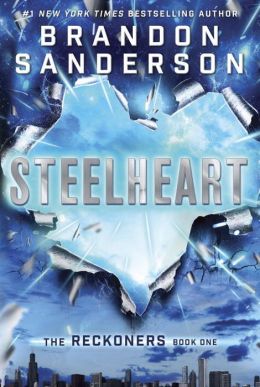Rarely do stories engender in me as many conflicting
emotions as Brandon Sanderson’s sci-fi/fantasy novel Steelheart, the first of the Reckoners series. Tapped by Drew E. as the Galloway Book Club’s choice for the month of February, I approached the
400 page novel expecting a campy, melodramatic plotline with the approximate
literary value of Go Dog Go, bound
tenuously together by intermittently hard-to-follow action sequences and a
poorly constructed romantic subplot. I found exactly what I expected.
And I couldn’t put it down.
Steelheart is a
fantastical dystopian novel, set ten years after the appearance of a glowing
red star in the heavens, known as Calamity. Roughly a year after Calamity’s
appearance, certain humans began manifesting various powers—such as flight, the
ability to create forcefields, super agility, impervious skin, and other
equally ridiculous capabilities—and, for one reason or another, those
individuals became implacably evil with no regard for human life. Such people
are known as Epics.
I’m sure that description prompted many of you to role your
eyes back into your head; the plot does, I wholeheartedly agree, sound patently
ridiculous. But it is a siren, my friends, luring any readers within its range
to dash their brain upon the rocks of literary mind candy. Seriously, after the
first chapter I began counting down the time until I could read again. My sleep
suffered. Had the novel been longer, a significant decline in my academic
performance wouldn’t have been surprising. Throughout the course of reading the
book, I suppressed the part of my brain that steadfastly reminded me how,
objectively, I should find the novel silly rather than engrossing.
Sanderson’s protagonist, David, whose biblical name is
possibly the only allusion in the entire book, was an eight year old when the
High Epic Steelheart, now emperor of Newcago (used to be Chicago), killed his
father. Now, David is an 18 year old with a deep-seated hatred for Epics and an
even more intense desire for revenge. He has dedicated his adolescence to
studying epics and a mysterious group, the Reckoners, who wage war on them. With
incredible predictability, when a Reckoners cell appears in Newcago, David
manages to join them and lobby for an attack on Steelheart.
I just read the above paragraph, and once again, I’m amazed
at how much I enjoyed the book. I don’t know how it happened. What came over me?
Surely IQ points dripped out of my ears whenever I cracked the novel—but, after
some soul-searching, I regret nothing. Sanderson knows how to weave a tacky
plotline into a web of suspense, wind up his readers, and force them, against
their better judgement, to revel in a narrative brimming with superpowers,
vendettas, and dramatic confrontations. To read Steelheart is stare down the darker demons of our literary tastes,
which we all need to do once in a while.


